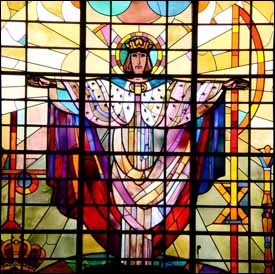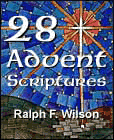
|
Old Testament
New Testament
Gospels
Acts
Paul's Letters
General Letters
Revelation
Topical Studies
Beginning the Journey (for new Christians). en Español

|
Old Testament
New Testament
Gospels
Acts
Paul's Letters
General Letters
Revelation
Topical Studies

|
Home
Bible Studies
Articles
Books
Podcasts
Search
Menu
Donate
About Us
Contact Us
FAQ
Sitemap
Day 9. Today I Have Begotten You (Psalm 2)
Monday, Second Week of Advent
 'Christ the King' (1955), stained glass, Christ the King Roman Catholic Church, Beverly, Chicago. |
We don't like to think of conflict at Christmas. We would much rather talk about, "Peace on earth, goodwill to men." But the truth is that King Jesus is a serious threat to anyone who will not follow him. Jesus seems to evoke powerful reactions. People can't remain neutral towards him when they understand who he is.
The Nations Conspire against the Messiah (Psalm 2:1-6)
Psalm 2 describes a kind of international conspiracy against Yahweh and his King among "the nations" and "the kings of the earth."
"1 Why do the nations conspire
and the peoples plot in vain?
2 The kings of the earth take their stand
and the rulers gather together
against the LORD
and against his Anointed One.
3 'Let us break their chains,' they say,
'and throw off their fetters.'
4 The One enthroned in heaven
laughs;
the Lord scoffs at them.
5 Then he rebukes them in his anger
and terrifies them in his wrath, saying,
6 'I have installed my King
on Zion, my holy hill.'" (Psalm 2:1-6)
The Apostle Peter declares that Psalm 2:1-2 is prophetic of the determination of Herod as well as Pontius Pilate and the Jewish leaders who recognize the threat and unite to kill Jesus (Acts 4:25-26).
Such a rebellion against the Messiah, the Anointed One,43 is not confined to earthly rulers. In Revelation, we see a cosmic rebellion against God and his Messiah couched in the symbols of a woman and her male child (Revelation 12:1-6), a battle between the archangel Michael and the dragon (Revelation 12:7-17), the Antichrist, the False Prophet (Revelation 13), and the Whore of Babylon (Revelation 17). It is a spiritual battle fought in heavenly places.
You Are My Son (Psalm 2:7-9)
The psalmist may have initially thought he was speaking of the Davidic king as a "son" in the figurative sense portrayed in the Davidic Covenant (2 Samuel 7:14-15; see Day 7).
"7 I will proclaim the decree of
the LORD:
He said to me, 'You are my Son;
today I have become your Father.'44
8 Ask of me,
and I will make the nations your inheritance,
the ends of the earth your possession.
9 You will rule them with an iron scepter;
you will dash them to pieces like pottery." (Psalm 2:7-9)
Verse 7 speaks of an especially close relationship between the Father and Son, Yahweh and his Messiah. However, such a relationship is difficult to interpret as speaking of a merely human king. And verse 8 seems to speak of a king who rules over the whole earth, not just the nations that surround Israel itself that was David's farthest domain. Verses 7-9 suggest a king who rules the entire world.
The Anointed One in verse 7 is identified as Jesus in Acts 13:33 and Hebrews 1:5 and 5:5. Verse 8 is also the source of the "only begotten son" terminology in John's writings.45
Now an important bit of Church history. It gets complex, but stay with me. In the days leading up to the Council of Nicaea in 325 AD, the Gnostic priest Arius (c. 256-336 AD) claimed that Jesus being "begotten" implied a time when he didn't exist, that, in a sense, he was created by God.46 Orthodox Christians have always maintained Christ's essential divinity, as clearly delineated in the Nicene Creed (originally in 325 AD and finally at the Council of Constantinople in 381 AD):
"We believe in ... one Lord Jesus Christ, the only-begotten Son of God, begotten of the Father before all worlds, Light of Light, very God of very God, begotten, not made, being of one substance with the Father...."
The Nicene Creed makes clear Christian's belief that Jesus is not some kind of divine human or lesser God, but that his divinity is on a par with that of the Father Himself
"In the beginning was the Word,
and the Word was with God,
and the Word was God.
He was in the beginning with God.
All things were made through him,
and without him was not anything made that was made." (John 1:1-3)
Jesus is fully God and fully Man. (More on the Nicene Creed on Day 28.)
Kiss the Son (Psalm 2:10-12)
The psalm concludes:
"10 Therefore, you kings, be wise;
be warned, you rulers of the earth.
11 Serve the LORD with fear
and rejoice with trembling.
12 Kiss the Son,47
lest he be angry
and you be destroyed in your way,
for his wrath can flare up in a moment.
Blessed are all who take refuge in him." (2:10-12)
In our day we see a general rebellion against God; a desire to live independent of God and not be under any obligation to the Great King. How foolish to conspire to overthrow Yahweh and his Messiah! Yet sometimes we see this kind of rebellion in our own hearts. Sometimes we struggle against God, we struggle against his will in our lives.
 Also available in book formats: PDF, Kindle, and paperback. |
The bottom line is that kings and rulers -- and you and I -- must renounce our rebelliousness. Rather, we must make peace with the Son with a kiss of homage and a knee bent before him.
He is and will be the rightful King of all. Will you let him be King in your life today? Will you kiss the Son?
Prayer
Lord Jesus, forgive the rebellion we sometimes find in our hearts. Help us renounce resistance and be your disciples indeed. We look forward to the time when you will reign over all, when "the earth will be filled with the knowledge of the glory of the Lord as the waters cover the sea." Come soon, King Jesus! Amen.
Discussion Question
Q9. (Psalm 2:1-12) Why does Jesus provoke such negative
reactions from some people? Why do people tend to resist any kind of authority?
What should we do when we detect resistance in our own hearts? What does it
mean to "kiss the Son" (Psalm 2:12)?
https://www.joyfulheart.com/forums/topic/2083-q9-begotten/
Endnotes
[43] The term "Anointed One" (NIV) or "Anointed" (KJV, NRSV, ESV) in verse 2 is māshīaḥ̣, from the verb māshaḥ, "to anoint, spread a liquid" (Victor P. Hamilton, māshaḥ, TWOT #1255c). Anointing was used in a ritual sense to apply oil to set apart to God religious items (Exodus 40:9-11) and especially people to divine service -- priests (Exodus 29:7; Leviticus 21:10; Numbers 35:25), kings (1 Samuel 10:1; 15:17; 16:13; 2 Samuel 12:7; Psalm 18:50), and finally Yahweh's ultimate King, the Messiah (Isaiah 61:1; Daniel 9:24-26).
[44] The phrase "today I have become your father" (NIV) or "begotten you" (ESV, NRSV, KJV) uses the Qal stem of yālad, used of females to giving birth and of males to act of begetting or insemination (R. Laird Harris, yālad, TWOT #867).
[45] John 1:14, 18; 3:16, 18; 1 John 4:9; 5:1, 18.
[46] The Jehovah's Witnesses have continued this idea that "only begotten" meant that Jesus was created. The Jehovah's Witnesses' New World Translation infamously translates John 1:1 as "the word was a god" rather than "the Word was God" (all other modern translations). Some liberal theologians, seeking to deny the inherent divinity of Jesus, have suggested that Jesus was an ordinary man who was "begotten" when he received the Holy Spirit at his baptism.
[47] Verse 12a has been translated variously "kiss the Son" (KJV, NIV, ESV), "kiss his feet" (NRSV, NJB), and "kiss the mighty one" (New English Bible). The Hebrew text (bar, "son") seems to be best translated as "kiss the Son." The other translations are based on emendations or conjectures of what a "corrupted" text originally said. But whether the translation is "kiss the Son" (as seems called for by the text) or "kiss his feet," the point is that the kings and rulers of the earth need to submit to Yahweh's anointed Son with the kiss of homage before he comes with might to put down their rebellion towards him.
Copyright © 2026, Ralph F. Wilson. <pastor![]() joyfulheart.com> All rights reserved. A single copy of this article is free. Do not put this on a website. See legal, copyright, and reprint information.
joyfulheart.com> All rights reserved. A single copy of this article is free. Do not put this on a website. See legal, copyright, and reprint information.

